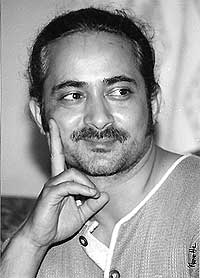 "I've written something," poet Viplob Pratik said in one of our first meetings, "and I want you to read them and tell me if they are poems." This, from a man who composes exquisite songs, who has written poetry since he was a child. I tried to laugh off his statement. But from his intent, candid tone, it was clear that he was serious. There was a time in his life when he was writing something almost every day, he explained. But in the past few years, for reasons beyond his own understanding, he'd been unable to write poems. "Now I'm starting again, but I don't know if what I'm writing qualifies as poetry."
"I've written something," poet Viplob Pratik said in one of our first meetings, "and I want you to read them and tell me if they are poems." This, from a man who composes exquisite songs, who has written poetry since he was a child. I tried to laugh off his statement. But from his intent, candid tone, it was clear that he was serious. There was a time in his life when he was writing something almost every day, he explained. But in the past few years, for reasons beyond his own understanding, he'd been unable to write poems. "Now I'm starting again, but I don't know if what I'm writing qualifies as poetry." All writers and poets have, at one time or another, been plagued by uncertainty about their enterprise. Doubt can be debilitating-it is at the root of that dreaded phenomenon, "writer's block"-but it can also be very productive, when met without fear. For, contrary to popular belief, a writer does not simply dash off whatever comes to mind. A poet does not just emote. Creating-in inspired flashes, or in drudgery-is merely half of what writers and poets do. The critical mind is equally engaged in the process of writing, and it is this mind that comments, sometimes honestly, and sometimes just brutally, "What a clich?," "Hasn't all this been said before?" "Is this-is anything-really worth writing about?"
Why should I write? What is achieved by it? And what is lost if I don't write? These are the questions that every writer or poet must grapple with as she develops her own voice and creates her own oeuvre. Even if one is to write, there are surely more useful things to write than stories or poems-perhaps this is why Pratik keeps a day job as an editor. To counter exactly this kind of scepticism about the worth of literature, William Carlos Williams has written:
It is difficult
to get the news from poems
yet men die miserably every day
for lack
of what is found there-
It is a sign of hope that someone like Pratik who has written from a young age should stop, investigate himself and his poetry, and then begin again, in humility. Even after overcoming such rudimentary, existential doubt, however, a poet faces a life full of-smaller, but equally vital-questions about his craft and his depth of vision. No matter how deep the drive to write, it must always battle doubt. To write, one must accept, even welcome questions. One must learn to keep writing with doubt.
How to write of sadness without bathos? How to speak eternal truths without generalisations? What kinds of line-by-line movements might make a poem fresh and unexpected? These are the craft and vision questions that face Pratik now, questions that he has answered with a quiet, restrained voice in the poem below:
REPOSE
Never, in my life, have I slept a collected slumber
I'll fall into a collected sleep now
Should anyone be bold enough to wake me
I'll sleep in such a way-I am a mountain
Jab me as much as you want, I won't feel a tickle
I am a rock
I'll shift if I'm moved-I won't budge otherwise
I am a boulder
Even if assaulted I won't make a response
I was the rains once-you wouldn't get drenched
I was the ocean once-you wouldn't swim in me
You wouldn't look at me when I once was a rainbow
Never, in my life, have I slept a collected slumber
I'll fall into a collected sleep now, today
The next poem is angrier in tone, more defiant. Yet the same careful word choice is in evidence, the same shift from line to line, from one difficult emotion to another.
THE UNDEFEATED PERSON
I stand alone in the field
Locking house windows, all of you are shrieking
I like the act of viewing people's spectacles
and I feel that people
are but a horde watching a spectacle
I'm proud-I stand alone in the field
I cry-I experience the suffering
of wounds/assaults/and thoughts
but I'm proud-I stand alone in the field
I'm eager to meet
young men who brave storms
young women who brave attacks
I'm eager to hold out a costly tray
decked with tears strung as finely as pearls
I stand alone in the field
The moon is alone/the sun is alone/the earth is alone
I stand alone in the field
Interestingly, Pratik's book reviews and comments on literature show off a bristling, keenly critical mind. It is, without doubt, harder for those with high literary standards to write than it is for the street-side hack: for once you know what constitutes great poetry, you don't want to commit doggerel. It takes great courage to confront one's fears, to answer one's inner critic, to try meeting one's own high standards. It also takes drive, the drive to live, fully, in art, the kind of drive expressed in Pratik's poetry.


